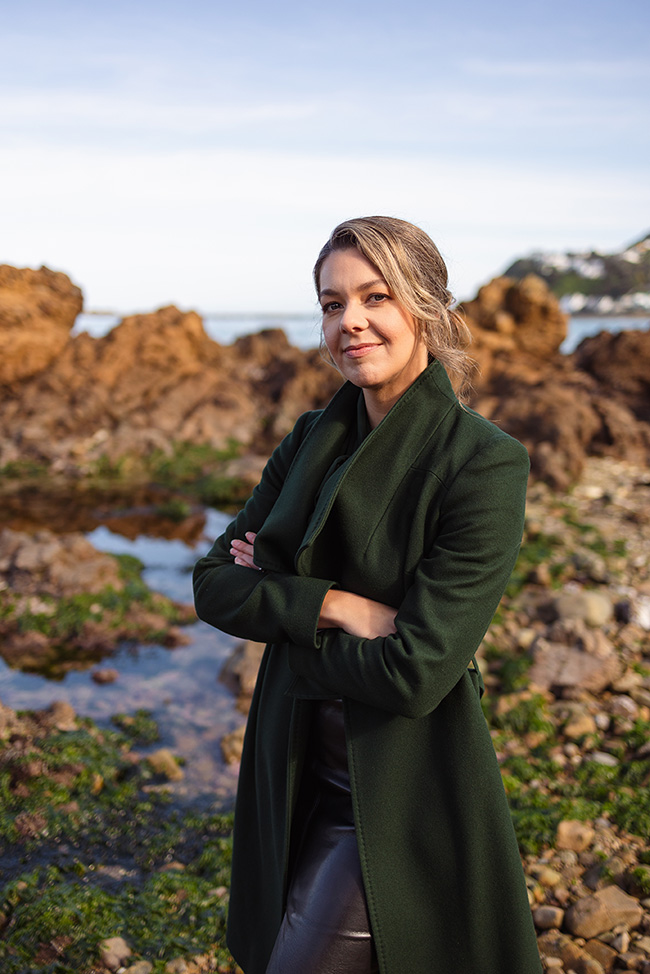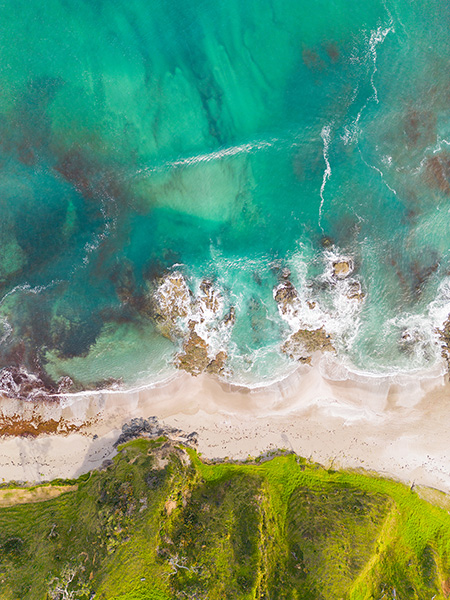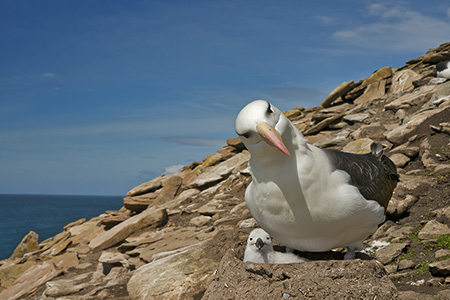Force of nature

For the first eight years of her life, Kayla Kingdon-Bebb was surrounded by trees. Living on the remote rainforest-cloaked coast of British Columbia, she was aware of environmental activism — but perhaps not from the angle one might expect.
Her father worked in forestry and their family car featured the bumper sticker: “Hug a logger — You’ll never go back to trees.” So, if a young Kingdon-Bebb was told that she’d grow up to lead an environmental NGO, she would have said that was pretty far-fetched.
Now, living on the wild coast of Wellington, New Zealand’s capital city, Kingdon-Bebb is the newly minted chief executive of the Aotearoa (the Māori language name for New Zealand) branch of global conservation giant WWF (the World Wide Fund for Nature). Her message is a little different to hugging trees — let alone loggers. “People are waking up to the realities of what climate change and biodiversity loss mean. They’re two sides of the same coin,” she says. “Our survival as humans relies on us dealing with both.”
Tracing the origins of Kingdon-Bebb’s journey into the wilderness of environmental advocacy goes back to her days at Queen’s and an exchange semester in Taiwan. She needed to pick up an extra correspondence course to complete her two degrees and the only suitable option was Introduction to Aboriginal Studies. It was transformational in a way she never expected. “I had this awakening to the realities of colonization and how what had happened in Canada and internationally was wrong and needed to be remedied,” she says.
The experience inspired doctoral research at Cambridge University in the U.K., where Kingdon-Bebb studied natural resource management and legal systems of the Nisga’a Nation, which in 1998 became the first Indigenous community in B.C. to sign a modern treaty with the provincial and Canadian governments. Cambridge was also where Kingdon-Bebb met her husband, Matt O’Connor. The couple moved to New Zealand in 2012 to further O’Connor’s medical training. It was there that Kingdon-Bebb found her way into nature, via public service.

An ocean nation
New Zealand has the world’s fifth largest ocean territory and is home to some 65,000 species and 80% of the country’s indigenous biodiversity. Yet less than 1% of New Zealand’s marine domain is fully protected.
“I love working on public policy. If there’s such a thing as a métier or a calling, I feel like I’ve really found it,” says Kingdon-Bebb. She started out as a policy analyst at New Zealand’s Ministry for the Environment after reading a “fascinating” newspaper article about Māori freshwater rights. After a couple of years cutting her teeth on freshwater co-governance, she shifted tack, becoming private secretary to the minister of conservation. The second minister she worked for, Eugenie Sage of the Green Party, describes Kingdon-Bebb as the exact opposite of the grey bureaucrat stereotype. “She’s a live-wire personality,” says Sage. “She’s smart, she’s strategic. She understands politics and personalities and knows how to get the best out of people and life. There is always laughter when Kayla is around.”
Weaving her expertise in Indigenous issues with a deepening knowledge of Aotearoa’s conservation landscape, Kingdon-Bebb’s stint at the Department of Conservation took her to many far-flung and spectacular corners of the country. The title of coolest place she’s ever been goes to the remote Antipodes Islands, about 860 kilometres southeast of the mainland. The 2018 trip, accompanying Minister Sage, involved a rough passage aboard a Navy vessel through the stormy Southern Ocean over multiple days and a stay in a hut that was once a supplies depot for shipwrecked sailors.
The trip marked the end of a four-year effort to rid the Antipodes Islands of introduced mice, which had invaded the remote archipelago that’s home to penguins, albatrosses and other seabirds, as well as two species of bright green parakeets found nowhere else. On other subantarctic islands, mice have been known to eat albatross chicks alive. That hadn’t been observed on the Antipodes, but New Zealand didn’t want to take any chances. Beyond preventing horrific albatross deaths, the removal of mice had other effects too. “What was absolutely astonishing was the recovery of the bugs,” says Kingdon-Bebb. “The huge diversity of moths, insects — and the smaller birds that live on the islands that are reliant on those invertebrates as a food source — also exploded.”
In the depths of public service, it’s possible to get stuck. And sometimes, you must stay silent, even if there are issues you’d really love to champion and defend. For Kingdon-Bebb, it was a controversial report on Indigenous rights she helped write in 2019 called He Puapua. The aspirational report outlined ideas for how New Zealand could achieve the goals set out in the UN Declaration on the Rights of Indigenous Peoples — especially self-determination, or rangatiratanga, for Māori.
Losing wildlife
A third of New Zealand’s native species are threatened or at risk of extinction, and many are found nowhere else on Earth. Several factors are driving biodiversity loss, such as introduced predators (like rats, possums and stoats), the spread of invasive weeds, climate change and human activity on land and sea. Species at risk include:

At first, the report was not made public. But when it was released in response to an official information request, in 2021, it caused a furor that spilled out into the national media. Some called the report’s recommendations “radical”, “divisive” and even “the end of democracy as we know it.” While Kingdon-Bebb wasn’t surprised by the reaction, she says critics shouldn’t have been surprised by the report’s contents either. “You can’t start engaging with the UN Declaration on the Rights of Indigenous Peoples and not countenance self-determination. It is literally the cornerstone of the Declaration. The report was always going to go there,” she says, adding that not releasing the report proactively contributed to the fear. “It was a master class in what not to do with a controversial report.”
As a government official at the time, Kingdon-Bebb couldn’t publicly defend the work she’s “really proud of.” Critical comments continue to bubble away online, two years on. In one online forum, anonymous commenters bad-mouth the He Puapua authors. “Never trust those with double-barrelled surnames,” one detractor writes. Kingdon-Bebb is unfazed. “The fact that it’s still in the national zeitgeist, I think, is a testament to the fact that these are questions worth asking and this a conversation worth having.” ›
Taking up the helm of WWF-New Zealand in February 2023 is a chance to unstick and unmuzzle herself. But she’s also stepping up at a time when the organization needs to rebuild. According to Sage, she’s “a great person to provide the leadership to put the organization back on a strong footing.” Kingdon-Bebb credits her grounding in business strategy as a major asset in her “recovery mission” to try and achieve financial sustainability, while also delivering conservation impact.
Globally recognized for its iconic panda logo, the bread-and-butter of WWF is combating wildlife extinction. New Zealand has no shortage of species at risk — more than 4,000 make the threatened species list. WWF-New Zealand supports on-the-ground conservation efforts through projects ranging from seaweed restoration through to rehabilitating sick and injured penguins.
But for the organization’s advocacy work, Kingdon-Bebb is focusing efforts strategically. “There are heaps of people working on our charismatic terrestrial species, our birds,” she says, noting that the country is unusual for its lack of native land mammals, save for two bats. “But we’re also the seabird capital of the world. Ninety per cent of our seabirds are threatened or at risk of extinction and many marine mammals are too. A lot of our critters in the ocean go . . . not unloved, but under-recognized because they’re out of sight.”
This means that at the top of the conservation outcomes list is boosting marine protection to 30 per cent of New Zealand’s ocean territory — the fifth largest on the planet. “It’s absolutely enormous. But less than half a per cent of it is protected,” Kingdon-Bebb explains. “That is pretty damning for a country that, back in the 1970s, was a global leader in ocean conservation.” In the first few months of her tenure, she’s been outspoken on this failing and on a collapsed proposal to create a massive ocean sanctuary north of New Zealand, around the Kermadec Islands. In April, she penned a column with the title “We are killing our ocean, so why isn’t the government acting?” on the popular New Zealand news site Stuff. Behind the scenes, she’s deploying her political nous to influence decision-makers.
Politically, marine protection has proved as thorny as a sea urchin, with 50-year-old marine reserve legislation now sorely outdated in a society doing its best to uplift te ao Māori, or the Māori worldview. “You can’t really begin to grip any environmental issue or conservation action without engaging Indigenous rights and interests,” says Kingdon-Bebb. The idea of no-take reserves, in which no fishing is allowed in perpetuity, doesn’t mesh with some Māori approaches to management of the moana (ocean). Instead, te ao Māori often favours the rotation of resources using temporary harvesting restrictions called rāhui.

Save the seabirds
Home to penguins, albatrosses, petrels, shags, gannets, terns and skuas, New Zealand is the seabird capital of the world. One-quarter of Earth’s seabird species breed there — and of those roughly 90 species are found nowhere else. Many are endangered. Commercial fishing practices are a major threat. Others are the loss of habitat, introduced predators, plastic pollution and climate change.
Kingdon-Bebb believes the country needs new marine protection tools — alongside a raft of other measures, like active restoration — to boost ocean health. With her expertise in Indigenous issues, she is well-placed to navigate the choppy waters to 30 per cent protection by 2030 — the international target New Zealand signed up to as part of the Kunming-Montreal Global Biodiversity Framework at the UN Biodiversity Conference (known as COP15) in Montreal in 2022.
Marine protection is not just a solution for nature, but also for the climate and people too. “We know that protected areas have a really important role as refuges for threatened species — the last kind of safe place they can call home. But they’re also really important in climate action because good, healthy wilderness is our best intervention when it comes to carbon sequestration and adaptation.” Kingdon-Bebb is keenly focused on these win-wins at the nexus of biodiversity and climate change, which are dubbed nature-based solutions.
For example, think of a sea wall versus a wetland. Both can help adapt to rising sea levels by protecting homes against storm surges. But wetlands also provide a home for flora and fauna. Plus, sea walls are capital-intensive, short-term fixes, whereas restoring a wetland or mangroves is more enduring and cheaper over time. “We have trouble putting a dollar sign on environmental benefits,” Kingdon-Bebb says. “But in the climate adaptation space, the environmental, social and economic benefits of nature-based solutions stack up way better than hard infrastructure.”
I’m on a mission to underscore to our political decision-makers that investing in making the change we need now to secure a safe future for future generations is not a nice-to-have,” she says.
It’s a tough mission in the wake of the cost-of-living crisis, which has seen politicians “kick the can down the road” on climate and biodiversity in favour of making gas cheaper for consumers. But Kingdon-Bebb radiates infectious energy and intellect that is sure to inspire Kiwis of all stripes, who care deeply about wildlife and wild places — so much so that New Zealanders are nicknamed after one of their unique bird species.
“We’ve got a great organization, we’ve got a great brand and we’ve got a mission that New Zealanders care about. I feel really optimistic.”
